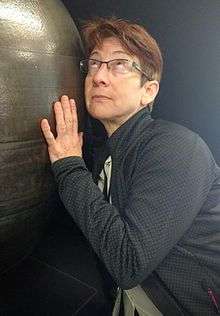Arienne Dwyer
Arienne Dwyer is a professor of Linguistic Anthropology in the Department of Anthropology at the University of Kansas, where she has been affiliated since 2001.[1] Since 2010 she has served as co-director of the KU Institute for Digital Research in the Humanities.[2]

Dwyer conducts research into the languages and cultures of Inner and Central Asia, especially languages in the Turkic, Sinitic, and Mongolian families. She earned her PhD in 1996 in Altaic and Chinese Linguistics at the University of Washington.[3] She has also published pedagogical and linguistic materials for the Uyghur language.[4]
Her research is notable in arguing for the areal significance of Chinese Inner Asia as a Sprachbund, a region of language convergence. Her research also looks at issues of language death.[5] In 2014, her work led to her being named a Fellow of the John Simon Guggenheim Memorial Foundation.[6][7]
Dwyer served as co-director with Carlos Nash of the 2012 Institute on Collaborative Language Research (CoLang 2012).[8][9] CoLang, formerly known as InField, is an international training workshop in field linguistics and language documentation supported by the National Science Foundation.[10]
Selected publications
Dwyer, A.M. 1998. “The texture of tongues: Languages and power in China,” Nationalism and Ethnic Politics, vol 4, issue 1-2.[11]
Dwyer, A.M. 2005. The Xinjiang conflict: Uyghur identity, language policy, and political discourse. Washington, D.C.: East-West Center.
Dwyer, A.M. 2006. "Ethics and Practicalities of cooperative fieldwork and analysis,” In N. P. Himmelmann, Essentials of Language Documentation. Walter de Gruyter.
Harrison, D., D. S. Rood and A. Dwyer. 2008. Lessons from Documented Endangered Languages. Philadelphia/Amsterdam: John Benjamins.
References
- "Arienne M. Dwyer". Department of Anthropology. 2012-10-24. Retrieved 2017-09-04.
- "IDRH Staff". Institute for Digital Research in the Humanities. 2013-01-11. Retrieved 2017-09-04.
- ""CESWW" - Dissertations in Central Eurasian Studies - Linguistics". cesww.fas.harvard.edu. Retrieved 2017-09-03.
- "Full text of "Learning Uyghur Language"". archive.org. Retrieved 2019-02-26.
- "arienne dwyer - Google Scholar". scholar.google.se. Retrieved 2017-09-03.
- http://www2.ljworld.com/news/2014/apr/18/ku-anthropology-professor-wins-guggenheim/
- "John Simon Guggenheim Foundation | Arienne Dwyer". Retrieved 2019-02-26.
- http://www2.ljworld.com/news/2012/jul/08/institute-aims-keep-languages-alive/
- Dwyer, Arienne. "CoLang: Institute for Collaborative Language Research". Cite journal requires
|journal=(help) - https://www.nsf.gov/mobile/news/news_summ.jsp?cntn_id=121353&org=GEO&from=news
- Dwyer, Arienne M. (1998). "The texture of tongues: Languages and power in China". Nationalism and Ethnic Politics. 4 (1–2): 68–85. doi:10.1080/13537119808428529. hdl:1808/7067. ISSN 1353-7113.
External links
- Arienne Dwyer faculty home page at KU
- CoLang 2012 webpage